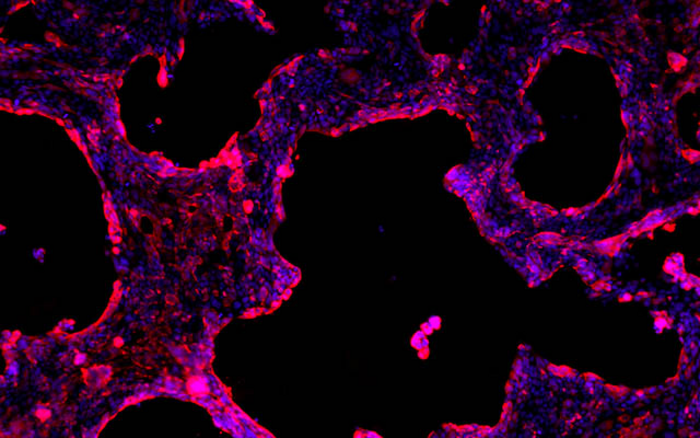Paxlovid is the leading oral medication for preventing severe cases of COVID-19 in high-risk individuals. However, symptoms returned in some patients after treatment was completed, prompting the Centers for Disease Control and Prevention (CDC) to issue a health advisory on this so-called “COVID-19 rebound.”

Credit: UC San Diego Health Sciences
Paxlovid is the leading oral medication for preventing severe cases of COVID-19 in high-risk individuals. However, symptoms returned in some patients after treatment was completed, prompting the Centers for Disease Control and Prevention (CDC) to issue a health advisory on this so-called “COVID-19 rebound.”
In a study published June 20, 2022 in Clinical Infectious Diseases, researchers at University of California San Diego School of Medicine evaluated one such patient and found their symptom relapse was not caused by the development of resistance to the drug or impaired immunity against the virus. Rather, the COVID-19 rebound appears to have been the result of insufficient exposure to the drug.
After a clinical trial showed that Paxlovid could reduce the risk of hospitalization and death from COVID-19 by 89 percent, the drug was made available under an emergency use authorization from the U.S. Food and Drug Administration in December 2021.
The treatment consists of two drugs — nirmatrelvir and ritonavir — which work together to suppress SARS-CoV-2 by blocking an enzyme that allows the virus to replicate in the body. It is easier to take at home compared to drugs like Remdesivir, which require intravenous injection. Treatment should be initiated within five days of symptom onset and taken twice daily for five consecutive days.
The research team, led by senior author Davey M. Smith, MD, chief of Infectious Diseases and Global Public Health at UC San Diego School of Medicine and infectious disease specialist at UC San Diego Health, set out to better understand the causes of COVID-19 rebound following Paxlovid treatment.
They first isolated the SARS-CoV-2 BA.2 virus from a COVID-19 rebound patient and tested whether it had developed any drug resistance. They found that after Paxlovid treatment, the virus was still sensitive to the drug and showed no relevant mutations that would reduce the drug’s effectiveness.
“Our main concern was that the coronavirus might be developing resistance to Paxlovid, so to find that was not the case was a huge relief,” said first author Aaron F. Carlin, MD, PhD, assistant professor at UC San Diego School of Medicine.
The team next sampled the patient’s plasma to test their immunity against SARS-CoV-2. The patient’s antibodies were still effective at blocking the virus from entering and infecting new cells, suggesting that a lack of antibody-mediated immunity was also not the cause of the patient’s recurring symptoms.
The authors said the rebound of COVID-19 symptoms following the end of Paxlovid treatment is likely due to insufficient drug exposure: not enough of the drug was getting to infected cells to stop all viral replication. They suggested this may be due to the drug being metabolized more quickly in some individuals or that the drug needs to be delivered over a longer treatment duration.
In the future, Carlin said he hopes physicians will be able to test whether patients require a longer duration of Paxlovid treatment or if they might be best treated by a combination of drugs. In the meantime, Paxlovid users should be aware of the possibility of symptom rebound, and be prepared to wear masks and quarantine again if symptoms return.
Further research is necessary to measure how often rebound occurs, what patient populations are most susceptible and if returning symptoms can lead to more severe disease.
“The goal of Paxlovid is to prevent serious illness and death, and so far no one who has gotten sick again has needed to be hospitalized, so it’s still doing its job,” said Smith. “We simply need to understand why the rebound happens in some patients and not others. More research is needed to help us adjust treatment plans as necessary.”
Co-authors include: Alex E. Clark, Antoine Chaillon, Aaron F. Garretson, William Bray, Magali Porrachia and Tariq M. Rana, all at UC San Diego, as well as AsherLev T. Santos at California State University San Marcos.
# # #
Journal
Clinical Infectious Diseases
DOI
10.1093/cid/ciac496/6611663
Article Publication Date
20-Jun-2022
COI Statement
Aaron F. Carlin has received contract payments from Nurix Therapeutics, Inc. and has options in Covicept Therapeutics Inc. Davey M. Smith has served as a consultant for Bayer Healthcare, Kiadis Pharmaceuticals and Signant Health, and has equity stake in Vx Biosciences, Model Medicines, Linear Therapies and FluxErgy, Inc.




